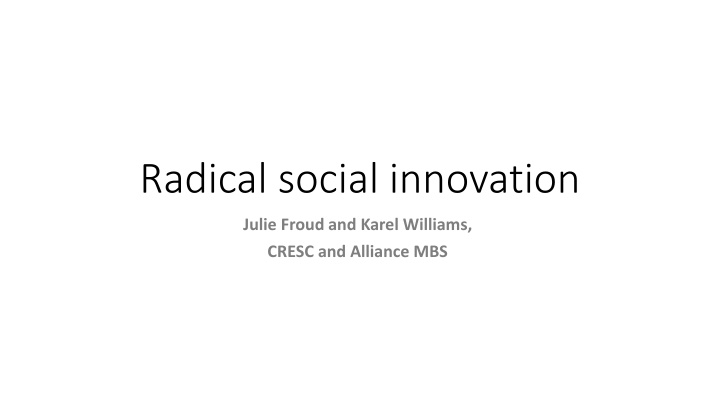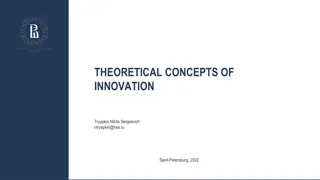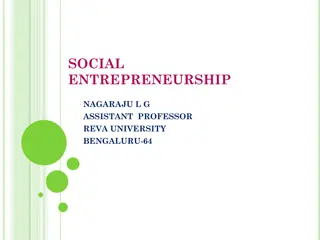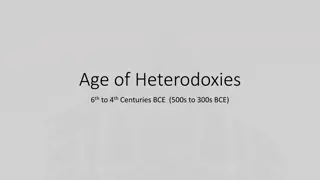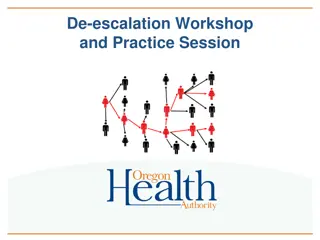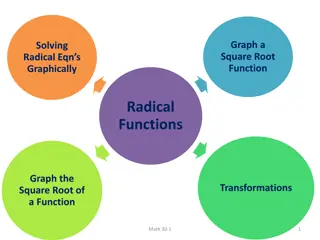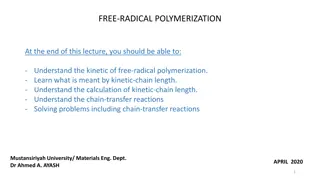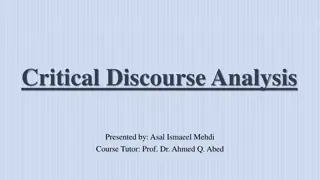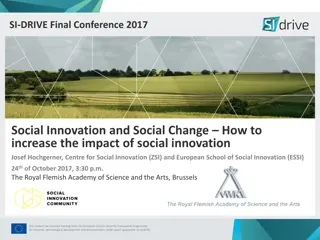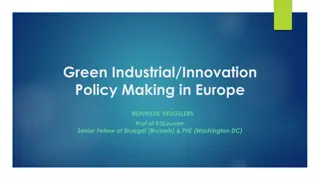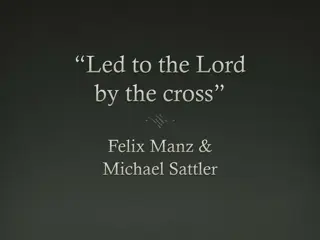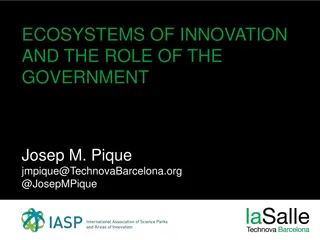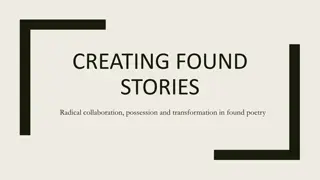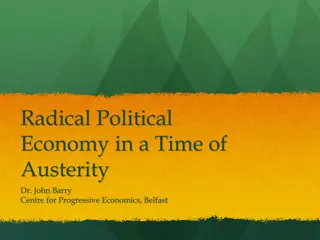Radical Social Innovation and Pushback: A Critical Analysis
Challenging the mainstream 'feel-good' approach to social innovation, this analysis by Julie Froud and Karel Williams advocates for a radical practice requiring political struggle, mobilization, and financial/ecological viability. It critiques the undiscussed aspects of mainstream usage, emphasizing the value of maintenance and highlighting the shortcomings of financial innovation in maintaining critical goods and services. It contrasts 'feel-good' social innovation with a more political and experimental approach for long-term sustainability.
Download Presentation

Please find below an Image/Link to download the presentation.
The content on the website is provided AS IS for your information and personal use only. It may not be sold, licensed, or shared on other websites without obtaining consent from the author.If you encounter any issues during the download, it is possible that the publisher has removed the file from their server.
You are allowed to download the files provided on this website for personal or commercial use, subject to the condition that they are used lawfully. All files are the property of their respective owners.
The content on the website is provided AS IS for your information and personal use only. It may not be sold, licensed, or shared on other websites without obtaining consent from the author.
E N D
Presentation Transcript
Radical social innovation Julie Froud and Karel Williams, CRESC and Alliance MBS
Argument: against 'feel good' usage and for radical practice of social innovation (SI) Against 'feel good' usage where SI is a way of capturing the future + social benefits; mainstream political cross reading from economist s concept of tech innovation Radical push back against the undisclosed in feel good : (a) the value of maintenance; (b) the dark side eg much financial innovation; (c) formatting without political participation For Radical SI as a different practice = 'Unger plus' i.e. requiring (a) political struggle + mobilisation (b) an experimental programme plus (c) financially + ecologically viable
(1) The mainstream politically acceptable (1) The mainstream politically acceptable 'feel good' concept of social innovation 'feel good' concept of social innovation
'Feel good' social innovation A political read across from the economists concept of technical innovation as (by its nature) a good thing: boosts productivity, spreads via market, ex post social benefit outweighs disruption eg autos replacing buggies Feel good SI meets unmet needs /softening the edges of markets; non- govt/ non-market solutions to problems = avoids confronting problems of either; worthy examples of add-ons: empowerment (e.g. fair trade) or para-provision (e.g. micro-finance). NB/ add-on = non-disruptive Political currency + circulation; rightist cover for retreat of government (e.g. Bloomberg in NY); centrist sweetener e.g. EU (2010) view that SI complements the Lisbon Agenda on knowledge economy; business appeal via Porter and Harvard Business Review world of shared value embedding a social mission in corporate culture
(2) Radical push back by focusing on whats (2) Radical push back by focusing on what s undisclosed in mainstream usage undisclosed in mainstream usage
Radical push back (1) the value of maintenance The importance of keeping things going instead of chasing novelty: especially given the non economy of domestic reproduction + the foundational economy of security and welfare critical goods and services consumed by everybody e.g. health and adult care, pipe and cable utilities, schooling Financialised capitalism is bad at defending and maintaining many basics e.g. the condition of electricity generation and distribution in the US or UK, where diesel farms are contracted to provide 650mw of back-up (Guardian 11 dec 2015) Maintenance is more than repair + Oakeshottian conservatism; it is not the opposite of innovation. As in The Leopard, very often things have to change so they can stay the same: the test = outcomes + values, not process; and the product = participation, minimum standards etc.
Radical push back (2) the dark side of innovation Innovation is not always the same and financialised capitalism has produced a flood of financial innovations which realise point value + work by bringing income forward and postponing liabilities; The democratisation of finance alibi = blown by the GFC after 2008 socialised losses after private gains; primary benefits for financial intermediaries + the coalition of senior lawyers, accountants and corporate CEOs and CFOs Result = not a solution but a problem because financial innovation increases inequality by rewarding working rich; and spreads costs by increase the cyclicality and instability of the economy Na ve economists productionist policy aims to promote tech based innovation in new industries/knowledge economy; not focusing on (a) tech s enclosure in finance eg Apple or (b) the probably more important task of curbing innovations like debt based financial engineering or the arbitrage of limited liability eg in outsourcing
Radical push back (3) formatting of provision without participation 'Take it or leave it' provision in most of the welfare critical areas of the foundational economy: little political participation in provision of many goods or services; econ participation thro market choice is limited by standard formats + complicated by confusion marketing (e.g. supermarkets where in UK 40% of lines are on special offer, or utility tariffs) There is a problem about relating expert knowledge and popular choice but in many areas the prior constraint is formatting ex (a) business model requirements of private players (e.g. adult care local authorities in UK buy tasks in time slots + financialised chains build 60 bed homes to cover manager s salary + return on capital); (b) reinforced by political classes propping up business models (e.g. Dilnot report = how to tap household equity to keep adult care going or student loans to cover degrees for half the age cohort).
(3) For the practice of radical social innovation: (3) For the practice of radical social innovation: political mobilisation, experiment, viability political mobilisation, experiment, viability
For the practice of radical SI (1) political struggle and mobilization Radical SI is at the heart of a political/ social/ economic argument about what matters + how its measured e.g. dash board of security-related metrics, not activity-related GVA; political because relates to citizen entitlements (not consumerist choice , nor political projects of reform ) Radical SI needs social entrepreneurs whose work is limited unless aligned with broad social coalitions to give political force, voice, impetus. This is Unger s collective project for society which meets econ. + polit. resistance because it will disrupt profit opportunities, redistribute resources and power. The question of political forces and coalition does not have an easy answer given the collapse of distinctively social democratic parties and their detachment from what remains of organised labour; the nexus of national problems analysed for US in Frank s Listen, Liberal hence importance of bottom up attempts at escaping centralising, elite control
For the practice of radical SI (2) experimental programmes Radical SI is about multiple, explicitly experimental programmes: analysing, learning, evaluating success and failure, upscaling + moving on; multiple because there are many fronts + uncertain outcomes Unger s notion of foreshadowing : small scale initiatives are the provinces of a movement but experiments are also a means of changing the landscape/ ecosystem (not as isolated exemplars) Breaking with the generic approach exemplified by 'structural reform' which promotes the same politically sponsored market creation or skills and training for every city region (= having the answer before one begins). Need to engage specifics; analysing activity characteristics, differences between regions, variegation within cities, inter-relation between local success and failure (= starting from a concrete analysis)
For the practice of radical SI (3) financial + ecological viability Radical SI needs to develop financially viable business models: what s the operating model i.e. who pays + the business model for financing assets and managing risks and rewards. 'Unger plus' because financial illiteracy is a disabling condition in financialised capitalism; establishes false necessity + makes status quo opaque eg railway finance in the UK; encourages (a) utopianism of the left eg renationalise (with compensation) and (b) illusions eg about the inherent virtue of not for profits when many can and do use the devices of financial engineering. But also understand the limits of the financial numbers: they establish constraints and possibilities eg public borrowing; but the numbers will never tell you what to do because (a) the big macro picture eg on climate change isn t in the micro numbers (b) action depends on social values and the balance of political forces The value of expertise as necessary counter to confident assertion of the radical right and over simplifying populism eg on immigration; but the need to redistribute expertise away from a single paradigm 'econocracy' as envisaged by the radical students on economics for everyone; implies an engaged role for many kinds of social science in evaluating experiments + appraising viability
In sum: a new agenda for radical SI In sum: a new agenda for radical SI New agenda recognises the preconditions of radical SI: collective vision, political mobilisation, experimental engagement with specifics, finding a business model Aligned with Unger s (2015) maximalist SI which finds new practices and institutions to deliver solidarity and community ; not appeasement to austerity or attempts to humanise a reality Come back finally to the limits of the concept of innovation (if it is falsely set up as the opposite of maintenance); innovation is not about changing product and process (though these will change), it is about redefining values and outcomes for a changing world.
